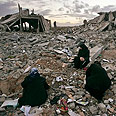
Destruction in Gaza
צילום: AP
Iraqi FM: Arabs unable to agree on Gaza statement
At end of a two-day Arab Economic summit in Kuwait, Hoshyar Zebari says efforts still ongoing to reach agreement on Strip following three-week Israeli offensive
Arab countries have been unable to agree on a unified statement about the Gaza Strip following Israel's devastating three-week offensive, Iraq's foreign minister said Tuesday.
The crisis in Gaza has divided Arab countries into two camps - one supporting Hamas' hardliners, the other hoping to lure the Palestinian militant group toward more moderation. The political division could affect the stability of the fragile cease-fire in Gaza, which was in its third day Tuesday.
"Unfortunately, we didn't reach a final result because of time limits and because some are entrenched in their positions," Iraqi Foreign Minister Hoshyar Zebari told state-owned Kuwait Television at the end of a two-day Arab Economic summit in Kuwait, which had been dominated by Gaza.
He did not name any countries, but stressed that "everybody has to make concessions" and efforts were still ongoing to reach agreement.
Zebari's comments come a day after Saudi King Abdullah urged the deeply divided Arab countries to end their rift and warned Israel that an Arab peace initiative would not remain on the table forever.
The king, who along with Egypt have been pressuring Hamas to be more moderate, even invited his Arab rivals - the leaders of Syria and Qatar - to lunch at his Kuwait residence.
Following the meal, Qatar's prime minister expressed optimism that both camps could work together, and local media praised the gathering as a historic "Arab reconciliation."
But Egyptian President Hosni Mubarak took a veiled swipe at Syria by criticizing Iran's ties with some Arab leaders - indicating that the two sides were still divided. The Persian country and the Lebanese militant group Hezbollah are two of Hamas' main backers and both have strong relations with Syria.
Egypt and Saudi Arabia, both staunch US allies, initially blamed Hamas for the Gaza crisis. Later, as the Gaza death toll increased and public pressure in the Arab world to support Hamas mounted, the two Arab powerhouses shifted their accusations toward Israel.
More than 1,250 Palestinians and 13 Israelis have been killed during three weeks of combat in Gaza, which Israel said it launched to halt Hamas rocket fire.
But the divisions between Arab countries grew deeper last week when Qatar hosted a summit. Egypt and Saudi Arabia led a boycott of the gathering, which Qatar had called to take a united stance on Gaza but ended up being dominated by supporters of Hamas.
The two sides also are divided about what should be done with the Arab peace initiative - first proposed by Saudi Arabia in 2002 and relaunched in March 2007.
At the summit in Qatar, Syria called for putting the peace initiative on hold - a more radical position than the one outlined by Abdullah on Monday.
The Arab peace initiative offers Israel collective Arab recognition in exchange for Israeli withdrawal from territory it occupied during the 1967 Mideast war, the establishment of an independent Palestinian state with East Jerusalem as its capital and a just solution to the problem of Palestinian refugees.
Israel initially rejected the initiative in 2002, but in the past year has said it could be a starting point for discussions.
But prospects for Arab-Israeli peace seem dim following the Gaza offensive and continued divisions among Hamas and its Palestinian rival, Fatah, which controls only the West Bank. Hamas seized control of Gaza in June 2007 and the two Palestinian groups have been unable to come up with a power-sharing agreement.










